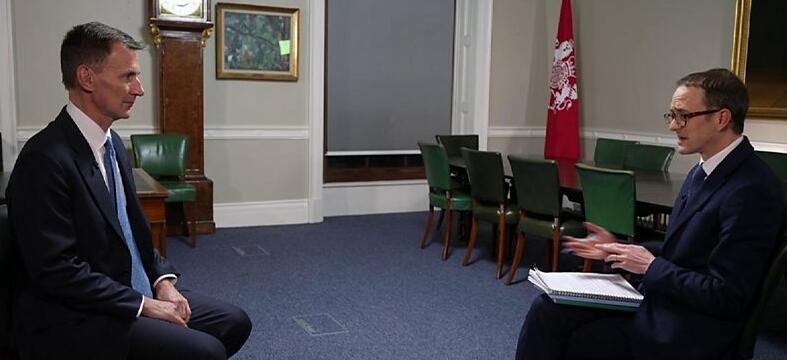Chancellor Jeremy Hunt has announced a bigger than expected cut in National Insurance in his Autumn Statement.
The main rate will go down from 12% to 10% from January – although previous tax changes mean many workers will not be much better off.
Mr Hunt also increased the state pension by 8.5% from April and said universal credit will rise by 6.7%.
The UK is predicted to narrowly avoid recession this year but growth forecasts have been sharply downgraded.
Mr Hunt used his hour-long Commons speech to claim the government had put the economy “back on track” by halving inflation – the rate at which prices go up – and reducing borrowing.
This meant he had room – within the government’s self-imposed rules – to cut taxes in an effort to boost economic growth, as he prepared the ground for next year’s general election campaign.
He confirmed that a tax break for companies that invest in new equipment would be made permanent, which he claimed was the “biggest business tax cut in modern history”.
But the percentage of the nation’s income being paid in tax is still set to rise to its highest level in 70 years, according the Office for Budget Responsibility (OBR).
The OBR also slashed its growth forecasts for the next two years, to 0.7% in 2024 and 1.4% in 2025 – and said living standards would not return to pre-pandemic levels until 2027/28.
The reason for this, the watchdog added, is that inflation is expected to “remain higher for longer”, returning to its 2% target in 2025, a year later than forecast in March.
Interest rates will also be higher for longer, according to the OBR’s report. House prices will grow by 0.9% in 2023 and then fall by 4.7% in 2024, it adds.
Speaking after his statement to the BBC’s political editor Chris Mason, Mr Hunt said the tax cuts announced in it were “just a start”.
“Perhaps these are not the headline taxes, but they will help to grow the economy and grow people’s salaries and that’s the way we improve living standards for families up and down the country,” he added.
He said the OBR’s downgraded growth forecasts were still a “big improvement” on a year ago.
Other Autumn Statement announcements include:
- Benefit cuts for unemployed people and those with disabilities who are judged to be not doing enough to find work
- The minimum wage is to increase by more than a pound to £11.44 per hour from April next year
- A freeze on alcohol duty until August next year, with no increase in duty on beer, cider, wine or spirits
- Tobacco duty to rise by 2% above inflation, with the duty on hand-rolling tobacco to rise an additional 10% above inflation
- Unfreezing the Local Housing Allowance, to help people pay rising rents
- Extending the 75% business rates discount for pubs, restaurants and leisure businesses for a further year
Mr Hunt said he had come up with “110 growth measures”, including £500m for artificial intelligence research, plans for more generous tax relief for TV and film production and £4.5bn over five years to attract investment into key manufacturing industries.
He also stuck to the government’s “triple lock” pension guarantee, increasing it in line with average earnings. It means someone on the full state pension will get just over £17 a week more.
But the centrepiece of Mr Hunt’s statement was the two percentage point cut to National Insurance, which applies across the whole of the UK.
The chancellor said the reduction – which was twice as large as expected – would help 27 million people and “means someone on the average salary of £35,000 will save over £450 a year”.
He also abolished Class 2 National Insurance – a £3.45 a week tax on the profits of two million self-employed people.
But Mr Hunt’s decision last year to freeze the level of income at which workers start paying National Insurance means millions will be dragged into paying higher rates or be forced to pay the tax for the first time.
Labour’s shadow chancellor Rachel Reeves said: “Today’s 2p cut will not remotely compensate for the tax [increases] already put in place by this Conservative government.
“The fact is that taxes will be higher at the next election than they were at the last.”
She added: “What has been laid bare today is the full scale of the damage that this government has done to our economy over 13 years.”
Conservative MP Kwasi Kwarteng – who was forced to resign as chancellor after his tax-cutting plans sparked a backlash from financial markets – said Mr Hunt’s statement was “a tentative step in the right direction”, which would be welcomed by “core Conservative voters”.
Writing in The Telegraph, he said: “Of course, I would have liked to have seen more tax reductions, but I fully understand why Mr Sunak and Mr Hunt are taking a cautious approach, given my own experiences last year.”
For the SNP, economy spokesman Drew Hendry said: “The chancellor wants you to think he’s pulled a rabbit out of the hat today but actually all he’s done is pulled the wool over many people’s eyes.
“Things are still getting worse for people. Inflation is still more than double the target that it should be and that means prices and costs for people in their homes are still going up day by day.”
The Liberal Democrats also accused Mr Hunt of “deception” and the government of being “out of touch and “out of ideas”.
The party’s Treasury spokesperson Sarah Olney said: “Conservative chaos has sent mortgages and tax bills soaring, today’s announcements won’t even touch the sides.”


